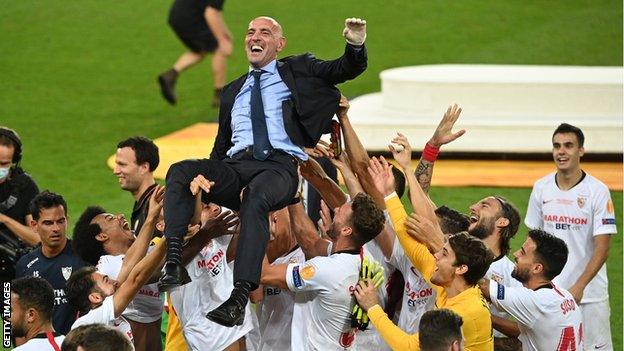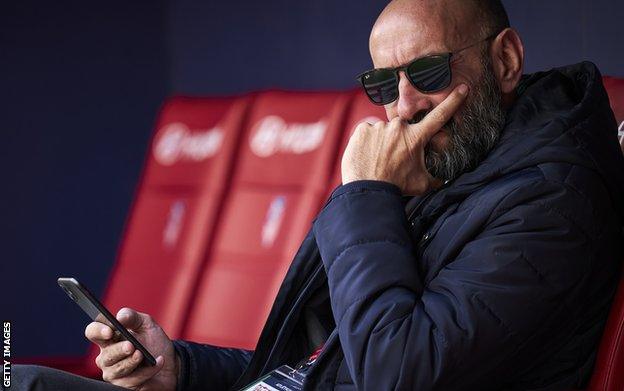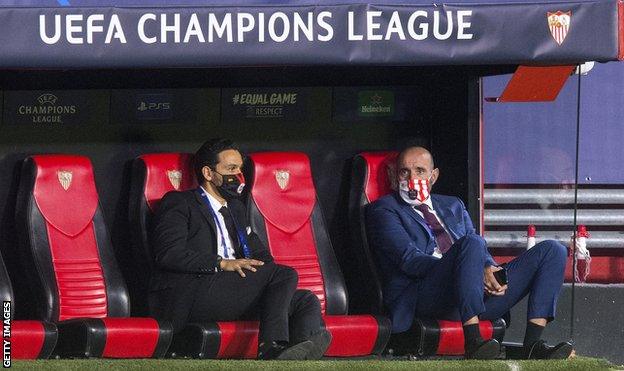Monchi: Sevilla sporting director on his methods and mission
- Published


Europa League winners again last season, Sevilla are currently fifth in the Spanish table
Ramon Rodriguez Verdejo has been in football for more than 30 years, but there is every chance you have never heard that name. You might, however, know him better by a different one: Monchi.
He was never considered a star on the pitch but, now aged 52 and having swapped his kit for a suit two decades ago, he is arguably the most recognisable and revered figure at Sevilla, the hometown club where he has spent almost all his career.
You could even reasonably suggest that his success, and the methods behind them, have transformed the job he has performed for 20 years - that of sporting director.
As a player Monchi - an alternative Spanish name for someone called Ramon - spent 11 years at Sevilla, mostly as a back-up goalkeeper.
He played 126 games for the club - the only one he represented - until his retirement in 1999. The following year, he was appointed to the role he has since made his own.
At the time, with no experience and with Sevilla in the Spanish second division, Monchi studied other clubs' methods in order to seek inspiration for his own. FC Porto and Lyon were among those he looked at - clubs who won titles, sold their stars and started over again.
The main lesson was to accept losing your best players, but make sure you replace them with someone of similar quality for a good deal less money.
Sevilla didn't spend a penny on transfers during Monchi's first two years yet still managed to build a team that returned to La Liga under current Armenia head coach Joaquin Caparros.
It wasn't until the following season, in 2002, that Monchi was given the green light to make his first investment: 500,000 euros on full-back Dani Alves, who first arrived on loan from Brazilian club Bahia.
Six years later, Barcelona would pay about £23.5m to sign a player who was arguably the best in his position for a decade.
The Monchi revolution had begun.
Sevilla have enjoyed 20 consecutive seasons in La Liga and, on Monchi's watch, 'sell to grow' has firmly become their philosophy. Star players haven't tended to stay long - but usually long enough to lift a trophy.
Their recent trophy haul is impressive: Copa del Rey winners in 2007 and 2010; Uefa Cup winners in 2006 and 2007; Europa League winners in 2014, 2015, 2016 and 2020. Monchi had a major hand in it all, despite briefly leaving for a two-year spell with Roma between 2017-2019.
By the time he left - seeking a different challenge - he had helped the club earn around £180m in profit from transfer dealings.
He is back at the club that he loves now, where he is widely respected and where on a typically bright Andalusian day thoughts are turning to Wednesday's Champions League meeting with Chelsea - with the winner of the game likely to top their group.
After a year unlike any other, both clubs can take comfort from their already guaranteed progress to the knockout stages.
"The truth is it has been quite an intense time, facing unknown scenarios and managing issues that go beyond a sporting director's responsibilities," Monchi tells BBC Sport.
"Negotiations have been a little bit more complicated. We had to rely on the work we had already done before lockdown. We assigned new tasks to our scouts, who reviewed again and again outstanding players we had been following for a while.
"We even planned different signings depending on future scenarios, including the cancellation of La Liga."
The signing of Ivan Rakitic is perhaps the standout of several typically shrewd moves executed by Monchi and his team in the south of Spain this summer.
The Croatian midfielder was signed for about 2.5m euros in from Schalke in 2011 and left in 2014 for Barcelona in a deal worth about 20m euros. In September, Sevilla agreed a nominal 1.5m euro fee to take him back, now aged 32.
While those deals are standard practice for Monchi, things have changed for him in 2020 - or rather, the Covid-19 crisis has accelerated change that was already under way. It has led to a major boost at the club's new data-driven research and development department, which was created in May 2019.

Monchi only played for Sevilla during an 11-year career on the pitch and the team is currently managed by another former goalkeeper - ex-Spain boss Julen Lopetegui
The scouting process in football is evolving quickly, and new forms of data are becoming increasingly valued. New stats and metrics such as expected goals (xG) are taken into account when making transfer decisions.
An increasing number of elite football clubs are trying to get the most out of the numbers, as has been done in baseball and basketball for years. Many of those employed tend to have no football background, but it doesn't matter as long as there are results.
"We compare the subjective point of view of our scouts with data's objective criteria," Monchi says.
"The fact they both almost always agree encourages us to make decisions. We trusted big data more this time because we have a more developed big data department.
"Although our platform is not 100% complete, it has helped us much more when analysing interesting players. Our data was not as accurate a year ago as it is today.
"We had 'small data' years ago. A scouting report on Microsoft Word was data. If a player is right or left footed, that's data too...
"Obviously, now we have better processed data, more information and we are more willing to rely on it. Confidence comes with use. You don't use something you don't trust.
"Nonetheless, we can't disregard the subjective point of view of a scout. What we have to do is to join both approaches."
Monchi and his team plan to expand this data revolution to also help inform various other sections of the club's operations, such as ticketing and marketing.
But building a system that can find the right players at the right price remains the priority. The algorithm they have developed analyses over 18,000 players that could fit the team. And behind the scenes, a new kind of transfer target is in Monchi's sights.
"We are currently talking with an artificial intelligence and machine learning expert with no football experience to join us. We are fighting with his current company, so to speak," he says.
"We want to keep growing. If you decide to build a research and development department, you have to provide people who would add value by understanding data from different angles."

Sevilla's best performance in the Champions League came in 2017-18, when they lost in the quarter-finals to Bayern Munich
Because of Monchi's success at Sevilla, an increasing number of football clubs have tried to follow their model. Clubs such as Benfica, Sporting Lisbon, Monaco and Ajax have flourished... and make even more profit than the Andalusians.
Others have preferred to rely on Monchi disciples, such as Victor Orta, who spent seven years under his tutelage and now fits in well with Marcelo Bielsa's Leeds United.
But big transfers remain the strategy favoured by many others.
That's the case of Chelsea, who drew 0-0 with Sevilla in the club's earlier Champions League meeting at Stamford Bridge this season. Kai Havertz, Hakim Ziyech, Timo Werner, Ben Chilwell and Edouard Mendy - signed for a total of about £222m this summer - could all feature at the Ramon Sanchez Pizjuan on Wednesday evening.
"I would like to believe the Chelsea directors are perfectly aware of their finances and their earning capacity, I'm convinced they are," Monchi says. "If you make an investment it's because your budget allows it.
"Chelsea spent the last few years kind of hidden in the football market [in part perhaps because of their transfer ban], but they have done some very good deals. Young players with a great projection that will prove profitable, on and off the pitch."
Monchi has never hidden his fascination with English football. In fact, he spent six months in London in 2013 to improve his English and do some research.
"I was looking for business information," he says. "Premier League clubs have a really advanced business model that I wanted to implement at Sevilla.
"They are able to make football really profitable through television, marketing and a sense of belonging - everything that made English football double in income to Spanish at that time."
Monchi sought inspiration in England at a time when English clubs sought their own Monchi. Today, many Premier League sides - such as Manchester City, Liverpool, Leeds United and Arsenal - do indeed have a sporting director. Manchester United are one club which does not.
"There are lots of successful clubs that entrust recruitment policies to different people: the general manager, the head coach or the sporting director. I prefer the last option, obviously, because it is the most balanced," Monchi says.
"It doesn't mean that Manchester United don't have a scouting department. Of course they do.
"They don't have Txiki Begiristain [Manchester City] or Michael Edwards [Liverpool] - both old friends of mine - but I'm pretty sure there are qualified professionals to make those decisions at Old Trafford. We are talking about top clubs, I have little or even nothing to teach them."
After 20 years making tough decisions, Monchi claims to know how to withstand the pressure. He is happy in his work and still feels he has plenty to offer. But he has already started to think about the timing of his own next transfer.
"I owe my family, my friends and myself too," he says. "I need to give that time back to them. Including me. That's why I won't be here for long.
"Everyone else comes second. I've known my wife since we were 15. My children, aged 27 and 21, were raised in these circumstances. I prioritise the club so much that I sacrifice my well-being. But I consider myself privileged. I've been doing what I dreamed of when I was a kid.
"Six hours of sleep is enough for me. I get up early to exercise, but during this time I'm also working since my smartphone and my computer are on. Disconnection doesn't make sense in my position.
"This will last as long as I feel happy. I haven't marked a date on the calendar. Today I come to work with the same ambition. I will walk away when I feel anxious when I open my office door.
"I'm lucky to have friends who don't get mad when I promise to call back... and I do it five days later."

Missed Industry?: Fast-living, expensive exploits and fallouts await in this hit new drama
Barack Obama Exclusive: The former president on his cautious optimism for the future and more
